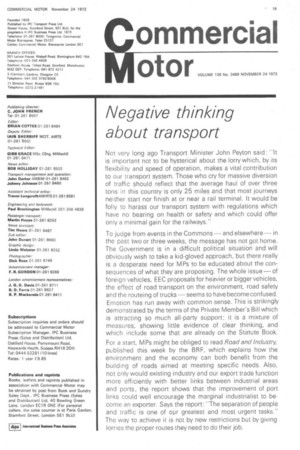Negative thinking about transport
Page 21

If you've noticed an error in this article please click here to report it so we can fix it.
Not very long ago Transport Minister John Peyton said: "It is Important not to be hysterical about the lorry which, by its flexibility and speed of operation, makes a vital contribution to our transport system. Those who cry for massive diversion of traffic should reflect that the average haul of over three tons in this country is only 25 miles and that most journeys neither start nor finish at or near a rail terminal. lt would be folly to harass our transport system with regulations which have no bearing on health or safety and which could offer only a minimal gain for the railways."
To judge from events in the Commons and elsewhere in the past two or three weeks, the message has not got home. The Government is in a difficult political situation and will obviously wish to take a kid-gloved approach, but there really is a desperate need for MPs to be educated about the con sequences of what they are proposing. The whole issue of foreign vehicles, EEC proposals for heavier or bigger vehicles, the effect of road transport on the environment, road safety and the routeing of trucks seems to have become confused. Emotion has run away with common sense. This is strikingly demonstrated by the terms of the Private Member's Bill which is attracting so much all-party support: it is a mixture of measures, showing little evidence of clear thinking, and which include some that are already on the Statute Book.
For a start, MPs might be obliged to read Road and Industry, published this week by the BR F, which explains how the environment and the economy can both benefit from the building of roads aimed at meeting specific needs. Also, not only would existing industry and our export trade function more efficiently with better links between industrial areas and ports, the report shows that the improvement of port links could well encourage the marginal industrialist to become an exporter. Says the report: "The separation of people and traffic is one of our greatest and most urgent tasks." The way to achieve it is not by new restrictions but by giving lorries the proper routes they need to do their job.












































































































